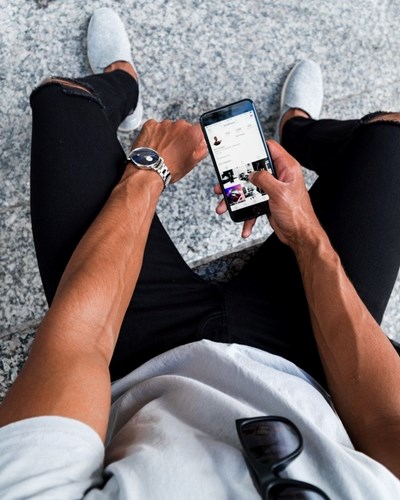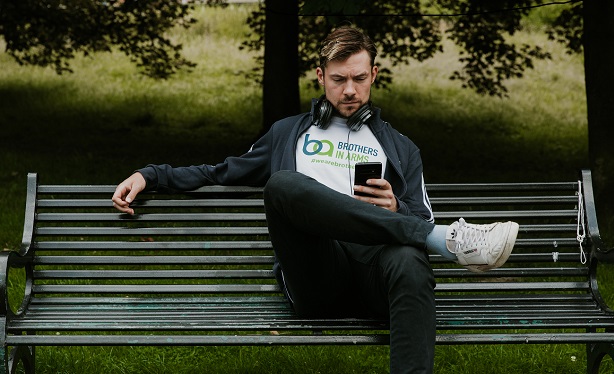For many men, apps can be ‘an important gateway to mental health’
Date: Monday 31 Jan 2022
For many men, apps can be ‘an important gateway to mental health’
By Andrew Reiner

For many months during the pandemic, Jason Henderson felt lower than perhaps at any other period of his life. The 37-year-old was living in a basement apartment, newly divorced, recovering from back surgery and struggling with depression so crippling he had suicidal thoughts.
A friend from an online men’s support group told the Vancouver, B.C., resident about a new peer support app for men’s mental health called Tethr. Henderson joined and began posting about his struggles.
“I was met with commiseration, empathy and compassion,” he told me. “That emotional support immediately helped me feel so much better.”
On the heels of a well-documented upsurge in anxiety, loneliness and depression sparked by the pandemic, mental health apps have become an important resource for men such as Henderson.
Many men, traditionally more reticent to seek out therapy, say these “cyber-well” and mental health apps, some specifically targeted at them, provide a peer community and support in a setting that provides both privacy and convenience. In interviews, men said one of the biggest advantages with these apps was anonymity.
The online help provides a “less intimidating entry to mental health,” says C. Vaile Wright, a psychologist who is senior director of health-care innovation for the American Psychological Association. “They are an important gateway to mental health for many men who need help but never considered reaching out for it before.”
Research has show that men often avoid seeking help because of gender expectations that they should not appear vulnerable or unable to handle their own problems, according to one recent study. They seek help for mental health struggles at approximately half the rate of women. Yet research has also shown that men are four times more likely to commit suicide than women, are more likely to abuse and die of drugs, especially opiates, as well as alcohol, and are at the forefront of the loneliness epidemic.
But it’s not fair, experts say, to blame men exclusively for this public health problem.
Men are far more likely to be underdiagnosed for mental health problems than are women, research has found, because many health-care practitioners often misread men’s symptoms. When metrics are used that more accurately gauge their symptoms — including irritability, aggression, risk-taking, substance and alcohol abuse, somatic complaints — men are nearly depressed as women, according to a 2013 study. None of these symptoms are included in the bible for mental health practitioners, the Diagnostic and Statistical Manual of Mental Disorders diagnosis criteria for Major Depressive Disorder, researchers reported.
The hope of those touting mental health and well-being apps is that the greater anonymity and privacy they proffer will erode men’s reticence about seeking help. No large studies have been conducted yet on men using these apps, but a 2018 study by researchers from Harvard Medical School and its T.H. Chan School of Public Health found that even before the pandemic struck, more than 225 million Americans had at least one of these apps on their smartphones. A 2019 meta-analysis found these apps can be an effective tool for a number of mental health conditions.
Some such as Tethr offer men a space where they can privately (or openly if they prefer) learn how to discuss their mental health and life struggles with something many now understand is crucial: emotional peer support. Tethr also offers a daily emotional “fitness” tracker, virtual men’s groups or “pods,” as well as videotaped podcast shows.
As with most apps, no licensed mental health professional directly oversees the posts that men share about their struggles or the responses they receive (although Tethr’s co-founders said they have gotten guidance from researchers with the Men’s Health Research Program and the University of British Columbia).
Users’ posts resemble text message exchanges about often angst-ridden topics — the anniversary of a parent’s death, a relationship ending, job loss, daily slogs with depression. Commiseration or empathy from peer app users inevitably follows. Members also are encouraged to share daily one-word check-ins around their physical, mental and emotional states. Both the daily check-ins and more elaborate postings are free. For an $8 fee per month, members can take part in weekly support groups.
Before joining Tethr, Jason Henderson was part of an in-person men’s group. He often felt unfulfilled by the group members’ responses to his struggles with depression and the resulting shame.
“The solutions and advice didn’t feel emotionally supportive at all,” he said. That changed, he said, when he joined Tethr. Fellow forum posters responded, “That sounds really rough” and “I can remember when I went through the same thing,” Henderson recalled recently.
In addition to showing empathy, it helped him “broaden my emotional vocabulary so I could talk about what my anxiety and depression looked and felt like.” This didn’t cure his depression, but it decreased its intensity, he said, and diminished his feeling of shame.
Such peer-to-peer support networks with the growth of mental health apps are what most excite John Naslund, an instructor of Global Health and Social Medicine at Harvard Medical School who specializes in mental health epidemiology and digital mental health.
Naslund said that the low-risk of self-disclosure with the apps, followed by emotional support from other men, is a safe and effective “gateway” to better mental health. And it teaches men how to create an emotional community in ways many of them have not been able to do before. These networks are virtual safety nets, he said, that “connect individuals with others facing similar challenges and offer commiseration within a safe, nonjudgmental virtual environment.”
The majority of mental health apps aren’t pegged to any specific gender. Two meditation-focused apps, Headspace and Calm, account for 90 percent of all active mental health/well-being app users, according to a 2020 study in the Journal of Consulting and Clinical Psychology. A few such as Tethr are designed for men, or have men-specific sections.
The app HeadGear, for instance, has a predominantly male user group that is instructed to spend five to 10 minutes a day, for 30 days, learning strategies for relaxation and mindfulness, to help them cope with stress and develop stronger emotional ties with other men. The app was developed through a collaboration among Australian nonprofit organizations focused on mental health at universities.
WellMind, an app endorsed by Britain’s National Health Service, offers a digital course that synthesizes mindfulness and cognitive-based therapy practices. Participants learn and practice techniques for mindful eating and breathing, body scanning for greater stress awareness and strategies for reacting to stress differently.
Georgia Hanias, a spokesperson for WellMind, said psychologists at the University of Surrey found that the app’s Be Mindful course, produced reduced rates of depression (63 percent), anxiety (58 percent) and stress (40 percent) in participants. While the course is for everyone, some 40 percent of the 102,000 course participants are men, Hanias said in an email.
Stephen Hastie is one of them. The course helped him deal better with stress and anxiety and “slow down and find more moments of stillness in my life,” he wrote in an email. “It hasn’t made [stress and anxiety] go away, but it has enabled me to . . . respond, rather than react, to situations.”
While praising the apps, Wright also cautioned that they aren’t a replacement for conventional in-person therapy. What’s more, some researchers worry that there’s a gap between the metrics that apps use and that clinical mental health professionals use to gauge their efficacy.
Wright said that perhaps the largest challenge for those wanting to try or use a mental health app is that no regulatory body oversees them. And the claims made by many of them often lack evidence-based research, she said.
“They’re coming out faster than the research can keep up with,” she said.
So how can someone needing help wade though the thicket of apps? (Or websites that focus on men, such as Evryman, HeadsUpGuys and Man Therapy?)
Stephen Schueller, associate professor of psychological sciences and informatics at the University of California at Irvine, recommended looking for ones designed with some degree of human interaction. That means they should provide feedback or support from, ideally, mental health professionals or, at least, trained peers who can commiserate.
Self-guided apps without direct human feedback can be effective with “small-to-moderate impacts on things like stress, anxiety and depression,” said Schueller, who is also executive director of One Mind Psyber Guide, which vets and rates digital mental health tools. “But apps with human support have been found to be as effective as traditional face-to-face treatments.”
Naslund suggested reading reviews of apps online to see whether research-based evidence exists to gauge the effectiveness and safety. Also, all the experts said it helps to try out the app with a free trial to see whether it’s easy to navigate.
Finally, since none of these apps are required to be compliant with the rules of the Health Insurance Portability and Accountability Act (i.e., patient privacy), little transparency exists, and they can sell users’ personal information without your knowledge. Consumers should find out where their data is going when they use an app and how it’s going to be used (for research? marketing?).
“If you at least know this,” Naslund said, “then you can make an informed decision about whether or not to use the app.”
Even with mental health care, caveat emptor — let the buyer beware — matters.
Andrew Reiner is the author of “Better Boys, Better Men: The New Masculinity That Creates Greater Courage and Emotional Resiliency.”
Content source: https://www.washingtonpost.com/health/men-mental-health/2021/11/19/790aa0a8-3024-11ec-a1e5-07223c50280a_story.html

